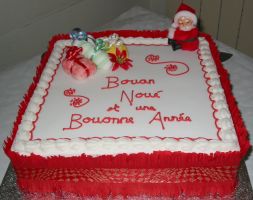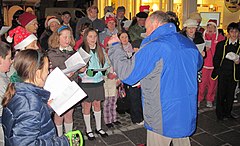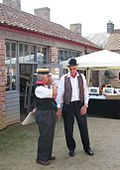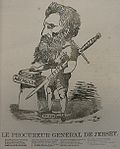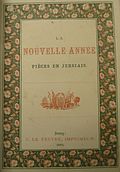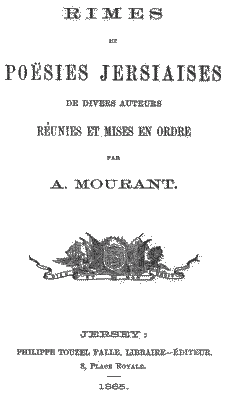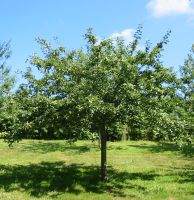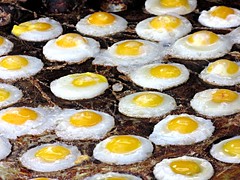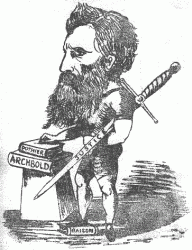Jersey Eisteddfod - Jèrriais Section 2010 Results
Vendrédi lé 19 Novembre - Salle Pârouaîssiale dé St. Ouën
ADJUDICATRICE Madanme Enid de Gruchy, ADJOINTE Madanme Joan Tapley
 Another successful Jèrriais Section of the Jersey Eisteddfod was again held at St. Ouen's Parish Hall by kind permission of Connétablye Ken Vibert. The Junior Section started this year's celebrations of our native language on 19 November and not a drop of rain was to be seen or felt! It was a family winners' night too, with a grandmother and grandson each enjoying success, (see below EUNE SÉTHÉE JÈRRIAISE). A pleasing number of parents were able to attend on this school day; we can always welcome more, as with all Eisteddfod sections. Our thanks go to those volunteers who work behind the scenes to ensure a memorable time and to the Adjudicatrice and her Adjointe (Assistant), Mrs Tapley stepping in to replace Mrs Audrey Falle who was unwell – we send her our very warmest wishes for a speedy recovery. The two Adult evenings were again poorly attended, it is difficult to know why this should be with a good number of native speakers still to be seen and heard around our Island. Doubtless the weather was a factor. Consideration will be given to trialling afternoon competitions in an attempt to improve attendances. The Adjudicator's Award for the Junior Competitor showing the most promise and/or pleasing performance went to a well-deserved Zac Sae Wong (see Class 604). The Adult Section Award again went to Audrey Lucas who, in the Adjudicator's words, gave 'perfect' performances! The results are as follows, with marks awarded following competitors' names:
Another successful Jèrriais Section of the Jersey Eisteddfod was again held at St. Ouen's Parish Hall by kind permission of Connétablye Ken Vibert. The Junior Section started this year's celebrations of our native language on 19 November and not a drop of rain was to be seen or felt! It was a family winners' night too, with a grandmother and grandson each enjoying success, (see below EUNE SÉTHÉE JÈRRIAISE). A pleasing number of parents were able to attend on this school day; we can always welcome more, as with all Eisteddfod sections. Our thanks go to those volunteers who work behind the scenes to ensure a memorable time and to the Adjudicatrice and her Adjointe (Assistant), Mrs Tapley stepping in to replace Mrs Audrey Falle who was unwell – we send her our very warmest wishes for a speedy recovery. The two Adult evenings were again poorly attended, it is difficult to know why this should be with a good number of native speakers still to be seen and heard around our Island. Doubtless the weather was a factor. Consideration will be given to trialling afternoon competitions in an attempt to improve attendances. The Adjudicator's Award for the Junior Competitor showing the most promise and/or pleasing performance went to a well-deserved Zac Sae Wong (see Class 604). The Adult Section Award again went to Audrey Lucas who, in the Adjudicator's words, gave 'perfect' performances! The results are as follows, with marks awarded following competitors' names:
JUNIOR SECTION
Clâsse 600. C’menchants – Lectuthe prépathée – êtudgiants 1ère année - Garçons et Fil’yes (Beginners – Prepared reading - 1st Year Students - Boys/Girls).
"L'Homme dans la Leune" trad. par Anon ou "Ma Tante Êlizabeth" trad. Par Anon.
Class Winner: Brandon Le Rossignol 91; Libby Rothwell 86, Lillie Godden 85, Isobel Medina 88, Rhiannon Baker 86, Samantha Neale 89, Owen Richard 90, Morgan Perrée 87, Jamie Godfray 84, Jay Hepburn 88, Kuba Zapala 88, Ryan Bisson 90, Jake McLennan 86, Willow Boulter 90, Lauren Cheshire 90, Rowan Tremayne 90, Sam Pigeon 88.
Clâsse 601. Lectuthe prépathée – êtudgiants 2ème ans – Garçons et Fil’yes (Prepared reading - 2nd Year students – Boys/Girls).
"Lé R'nard dans la Né" par GJ ou "Lé Six d'Janvyi 1781" par Ph'lippe Langlois (vv.1,8 & 9).
Class Winner: Jack Taylor 88, Delphinie McCarthy 83, Sarah Hansen 80, Conan Hughes 80, Peter Emmanuel 87, Robyn McGowan 83, Rhys Benest 83, Kurtis Buckley 82, Danielle Le Moignan 85, Daniel Sainter 87, Maria da Rocha 87, Kyle Falle 86, Carina Harris 84.
LA COUPE E.J. LUCE (Best in Classes 602/604).
Clâsse 602. Èrcitâtion – Set piece: Garçons et Fil’yes en d’ssous 15 ans.(Prepared reading - Boys/Girls under 15yrs).
"Man Gardîn" par ALP ou "Au Voleux!" par Elie (vv. 1-3,9)
Class and Cup Winner: Nicole Taylor 88, Laura Costard 87, Sammy Pitter 82, Hannah Bechelet 80, Emma Richmond 79, Alex Langlois 81, Anna Costard 87, Katie Le Feuvre 88, Rowan Pilley 89, Amy Sainter 80, Reuben Taylor 84, Matthew Rondel 82.
Clâsse 604 – Èrcitâtion / monologue dé san chouaix (avec ou sans script).(Own Choice reading/monologue – with/out script).
Class Winner: Nicole Taylor 91 (“Quand” Par Elie), Laura Costard 87 ("L'Ernouvé" par FMH), Daniel Sainter 86 (“Nouot' Péthe” trad.), Anna Costard 88 ("Nos poules" par ALP), Lucy Rountree 85, ("Baa Baa Nièr Mouton" trad.), Alex Langlois 86 (“Ma Vielle Brioche” par Elie), Matthew Rondel 80 (“Les Metchièrs” par GJ), Ryan Bisson 81 (“Les Metchièrs” par GJ), Zac Sae Wong 90 (“Man Papa” par FMH).
Clâsse 624 – Reading at sight – Boys and girls.
Class Winner: Nicole Taylor 89, Alex Langlois 85.
Clâsse 623. LA COUPE DES ENFUNTCHIS. Mousses – Èrcitâtion en tchoeu (Groups/Schools Choral Speaking).
"Lé Vièr Sonneux à son Violon" par AALeG (vv.1 et 3) ou "Lé Paîsson" par Elie.
Cup and Class Winner: JCG 90, St. Louothains 89, La Trinn'té 82, Samarés 85, Rouge Bouillon 86, St. Pièrre 84, Springfield 87, Janvrîn 80, Grouville 80, Bel Rouoya 85, Mont Nicolle 85, D'Auvergne 88, JCG Prep1 (Yr 4) 84, JCG Prep 2 (Yr 5) 83, Ste. Mathie 86, Les Tchennevais 83.
EUNE SÉTHÉE JÈRRIAISE – Vendrédi lé 19 Novembre à 7.30 heuthes du sé.
LÉ PRIX LUCILLE PICOT - STUDENT SECTION
Clâsse 606. Lectuthe prépathée dé san chouaix.
Jill Bartholomew “Lé Crapaud” par G. Le Feuvre 87.
Clâsse 607. Lectuthe à livre ouvèrt.
Jill Bartholomew 87, Iris Fritz 84.
ADULT SECTION Clâsse 605. Recitation – own choice (no scripts/costumes permitted).
LA COUPE C.W. BINET – MEMORIAL TROPHY
Clâsse 611. Èrcitâtion.
"T'en r'souveins-tu?" par Elie ou "La Fil'ye malade!" par Laelius.
Cup Winner: Audrey Lucas 94, Tony Scott Warren 92.
STUDENT SECTION
Clâsse 608. Dgialogue prépathé, au max. 5 mins.
Iris Fritz et Jill Bartholomew "La Campangnarde et la Villaise" par JT 84.
ADULT SECTION
LA COUPE G.W. de CARTERET
Clâsse 612. Èrcitâtion dé san chouaix (max. 4 mins).
Cup Winner: Phillippa Knight 86 – “Les Cats” par FMH
Clâsse 622. Èrcitâtion en tchoeu.
Les P’tits Crapauds (Femmes) 84 – "Lé Cahouain" par FMH; La Clâsse Întermédiaithe 85 – "L'Adresse desespethé dé Demouaîselle Nenné Caton ès moustachies" par NC; Les P’tits Crapauds (Hommes) 86 – "À ses patates" par Elie.
Clâsse 614. Duologue – dé san chouaix (max. 10 mins).
Audrey Lucas et Dulcie Jones 88 – "Un Rêve Accomplyi" par JT
EUNE SÉTHÉE JÈRRIAISE – Sanm'di lé 20 Novembre à 7.30 heuthes du sé.
 As is now custom, the Junior Section Class winners opened this second evening with a delightful mini gala performance of their individual pieces, to an appreciative but small audience. A surprised Zac Sae Wong was awarded his Adjudicator's cup after giving a repeat of his piece “Man Papa” with proud Papa and Manman (Maurice and Joy Marie, who had no idea of his award) again present! Joy too was a later joint-winner in Clâsse 617! Results for the final evening were:
As is now custom, the Junior Section Class winners opened this second evening with a delightful mini gala performance of their individual pieces, to an appreciative but small audience. A surprised Zac Sae Wong was awarded his Adjudicator's cup after giving a repeat of his piece “Man Papa” with proud Papa and Manman (Maurice and Joy Marie, who had no idea of his award) again present! Joy too was a later joint-winner in Clâsse 617! Results for the final evening were:
ADULTS
Clâsse 617. Pièche dé san chouaix (max. 4 mins).
Joint Class Winners: Jean Le Maistre 87 – "Les Douze Mais d'l'Année" par Anon and Joy Marie 87 – “Lé Gardîngni” par JT., Philippa Knight 86 – "Lé Jèrriais – Ma Langue" par MJV., Colin Ireson 86 – "Eune Bouonne Vacance" par JT., Simonne Guégan 83 – "Lé Dgèrnissement" par JJ, adapté par JT., Shirley Pirouet 80 – "Les Trais Léçons" par JP., Derek Le Cocq 79 – "As-tu 'té bouan?" par ALP., Sonia Ahier Kerr 82 - “Chanson d'Ernouvé” par Elie.
Clâsse 615. Duologue împromptu (ouvèrt).
Tony Scott Warren et Geraint Jennings 87, Colin Ireson et Winston Le Brun 85, Audrey Lucas et Dulcie Jones 90, Jean Le Maistre et Brian Vibert 88, Ted Syvret et Françouais Le Maistre 87.
LÉ PRIX LUCILLE PICOT
Clâsse 613. Lectuthe à livre ouvèrt.
Audrey Lucas 95, Colin Ireson 94, Simonne Guégan 87, Tony Scott Warren 94.
 The evening closed in customary humorous style with a non-competitive performance from “Les P'tits Crapauds” of a mock BBC live outside broadcast, scripted by Joan Tapley, from the Parish Hall. It was hosted by Chris La Pièrre (Tony Scott Warren) with newly elected Senateux Laiêsse Ecobichon (Colin Ireson) and new Parish Rector, Madanme Lé Révérend Lîzabé Acourt-Carré (Philippa Knight), who attempted to field some awkward questions from parishioners of St. Ouen – and even some from La Ville! EU vraic quotas, States grant aid to develop grow-and-boil-in-the-bag Jersey Royals and dog toilets in each Parish, all contributed to ready remedies and suggestions for our States Members! BBC Radio Jersey kindly loaned banners and equipment to add some authenticity, “Chris La Pièrre” even grew long silver hair, at very short notice!
The evening closed in customary humorous style with a non-competitive performance from “Les P'tits Crapauds” of a mock BBC live outside broadcast, scripted by Joan Tapley, from the Parish Hall. It was hosted by Chris La Pièrre (Tony Scott Warren) with newly elected Senateux Laiêsse Ecobichon (Colin Ireson) and new Parish Rector, Madanme Lé Révérend Lîzabé Acourt-Carré (Philippa Knight), who attempted to field some awkward questions from parishioners of St. Ouen – and even some from La Ville! EU vraic quotas, States grant aid to develop grow-and-boil-in-the-bag Jersey Royals and dog toilets in each Parish, all contributed to ready remedies and suggestions for our States Members! BBC Radio Jersey kindly loaned banners and equipment to add some authenticity, “Chris La Pièrre” even grew long silver hair, at very short notice!
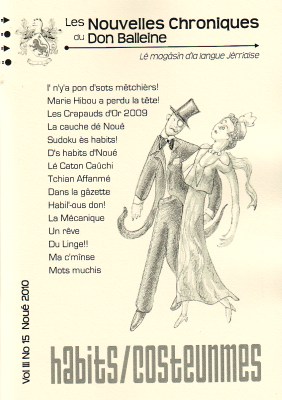 Habil'-ous! Attînt'-ous! Lé neunmétho d'Noué des Nouvelles Chroniques du Don Balleine est prêt à env'yer ès souscripteurs (souscrivez ichîn, s'ou voulez r'chéver vos Nouvelles Chroniques rédguliéthement). Lé thème est les habits et les costeunmes - et y'a même eune cauche dé Noué pouor les cheins tch'ont 'té bouons (tout coumme ou trouv'thez un Caouain là-d'dans...). Tony Scott Warren nos pâle dé sa c'mînse; George d'La Forge fut ravi par les faichons d's années 1960s; Elie distchutit du lînge en 1909; lé Tchian Affanmé s'en fut à Saint Saûveux pouor lé Tennerfest; Marie Hibou s'engîbâtrit coumme eune pilote (pas eune pithote) en 1932; Geraint Jennings raconte lé conte â l'entou d'l'âtre du Caton Caûchi; lé sudoku et les mots muchis sièvent lé thème; lé Sieur René Saint-Clair a contribué d'la Grand' Tèrre; Ralph Nichols pâle des habits d'Noué; et j'avons un nouvieau cantique dé Noué...
Habil'-ous! Attînt'-ous! Lé neunmétho d'Noué des Nouvelles Chroniques du Don Balleine est prêt à env'yer ès souscripteurs (souscrivez ichîn, s'ou voulez r'chéver vos Nouvelles Chroniques rédguliéthement). Lé thème est les habits et les costeunmes - et y'a même eune cauche dé Noué pouor les cheins tch'ont 'té bouons (tout coumme ou trouv'thez un Caouain là-d'dans...). Tony Scott Warren nos pâle dé sa c'mînse; George d'La Forge fut ravi par les faichons d's années 1960s; Elie distchutit du lînge en 1909; lé Tchian Affanmé s'en fut à Saint Saûveux pouor lé Tennerfest; Marie Hibou s'engîbâtrit coumme eune pilote (pas eune pithote) en 1932; Geraint Jennings raconte lé conte â l'entou d'l'âtre du Caton Caûchi; lé sudoku et les mots muchis sièvent lé thème; lé Sieur René Saint-Clair a contribué d'la Grand' Tèrre; Ralph Nichols pâle des habits d'Noué; et j'avons un nouvieau cantique dé Noué...
